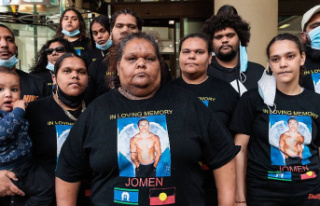After Russian President Putin imposed martial law in the annexed areas, there are growing concerns among Ukrainians living there about forced conscription. Those who cannot or do not want to flee hide - and hope that the Ukrainian army will free them.
With the imposition of martial law in the occupied territories of Ukraine, Russian President Vladimir Putin has formally created a basis for forcibly recruiting Ukrainians as well. This increases the danger that compatriots will soon face each other at the front. This is a nightmare scenario for Ukrainian President Volodymyr Zelenskyy: in his daily video address, he once again called on the men in the areas annexed by Russia not to be drafted into the Russian army under any circumstances. "Avoid that if at all possible!" Zelenskyj said.
Anyone who is able to flee from the Luhansk, Donetsk, Zaporizhia and Cherson regions should do so. Those who cannot flee should lay down their arms and defect to the Ukrainians. "The most important thing is that you save your life. And be sure to help others too!" Zelenskyy had already warned during the sham referendums in September that Russia could try to force Ukrainian men into the Russian army. In occupied Cherson there are still no calls for men to register. People were only asked to be evacuated by bus, reports a resident who wants to remain anonymous when asked by ntv.de. But the fear of being drafted is real. That's why he doesn't spend much time outside.
The US military expert and retired lieutenant general, Mark Hertling, considers forced recruitment to be quite possible. He writes on Twitter that Putin is resorting to a 17th-century device by trying to "dragonize" the Ukrainians. The term goes back to the "Dragons", a mounted unit of infantry in European armies of the 17th and 18th centuries, but in the English verb form ("dragoon") it also means to force someone into an action. The origin of the word lies in a coercive measure taken by the French king Louis XIV in 1689 to proselytize France's Protestants: they were forced to house dragoons in their homes at their own expense. They often plundered, blackmailed and abused the residents.
Hertling explains that during the 17th century the term was increasingly used to describe the compulsion of natives "to fight with arms against their will" - without feeling any loyalty to the ruler or any patriotic duty would have fulfilled. As a rule, they only had the choice between fighting and dying. "Only despots build an army like this," writes Hertling. Historical examples abound. During the Second World War, Hitler also had around 130,000 Luxembourgers forcibly conscripted into the Wehrmacht. It would be no different in the case of forced conscription in the occupied Russian territories.
There have already been several reports that Russia is forcing people to be called up - and not just in isolated cases, as the Russian exile portal Meduza reported in April. Accordingly, the first forced recruitments took place in occupied Donetsk shortly after the start of the war. With the partial mobilization in September, human rights activists brought to light incidents of targeted conscription of the Crimean Tatar ethnic minority - traditionally disloyal to Putin - in Crimea. There was also talk of raids. Hundreds of men were put on a bus, some by force, and taken to the local military headquarters.
It was reported from Mariupol that the city had been cordoned off. Nobody will be let out anymore. Former mayor Vadim Boychenko told WDR that it was clear the occupiers were waiting for a "so-called legal decision to begin mobilization." This decision was taken in the form of the annexation on September 30th. Just like this step, forced conscription is illegal under international law - and would add to the list of Russian war crimes in Ukraine.
According to the Russian interpretation, all residents in the annexed areas are Russian citizens - and can therefore also be drafted. A mobilization in the occupied territories would offer Putin the chance to at least partially conceal his enormous problems with mobilization in Russia - because this has not only triggered an exodus of men of military age, the consequences for Russia's economy are now also being felt. Small and medium-sized companies in particular are struggling to survive. In addition, the conscription caused new social tensions.
The Kremlin has therefore repeatedly emphasized that there will be no new wave of mobilization. It is officially said that the goal has been achieved. According to Russian information, more than 220,000 reservists have been drafted. But the disastrous supply situation and the poor equipment even in the training camps have meanwhile gotten around in Russia too. Putin is under pressure. In view of the debates in his own country, he might think it wiser to send men who had been conscripted from the occupied territories to the front; even if he has to fear that the men will capitulate in droves, leak information to the Ukrainians or sabotage their own army.
The annexations, the kidnapping of civilians to Crimea or Russia, and the "dragooning" are all "signs of Putin's ongoing strategic failure," concludes military expert Hertling. "He just improvises." Anyone who looks through the eyes of the Prussian military theorist Carl von Clausewitz at the three decisive factors in war, "the talents of the commander, the martial virtue of the army and the spirit of the people", can only bet on the Ukraine. Apparently many people do this in Cherson as well. One resident writes that he does not want to get on Russian buses and be “evacuated”. "We shop and wait for the Ukrainian armed forces to liberate us."












